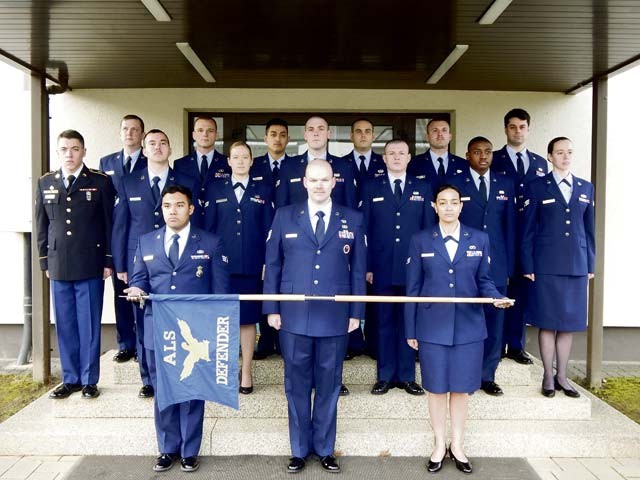
Defender flight poses in front of the Airman Leadership School building March 15 on Vogelweh. On the far left, Spc. Dean Iversen, 92nd Military Police Battalion gunner, is the first Soldier to attend ALS in U.S. Air Forces in Europe’s history.
Amidst the halls and classrooms of the 86th Force Support Squadron’s Airman Leadership School, Airmen are immersed in a culture of their own as they develop their leadership skills. However, joining these Airmen is a uniform pattern, a cultural background and a service member from a branch different than their own.
U.S. Army Spc. Dean Iversen is the first Soldier to attend the ALS course in the history of U.S. Air Forces in Europe.
Iversen said the compassion and cooperation the Airmen provided helped him transition quickly.
“When I first got here, I was a little nervous,” Iversen said. “But everyone has been really helpful, and I’ve met some people that go out of their way to help me.”
At ALS, Airmen are taught to be professional, warfighting Airmen who can supervise and lead Air Force work teams to support the employment of air, space and cyberspace power.
According to Iversen’s instructor, Staff Sgt. Mark Baker, 86th FSS ALS instructor, including Iversen in ALS is a remarkable feature of co-branch leadership.
“It’s such a great, unique opportunity,” Baker said. “Iversen has a bachelor’s degree and is more educated than many of his peers here. It makes us re-evaluate how they approach other branches and break down stereotypes.”
Learning how to lead among Airmen as a Soldier is an experience none of Iversen’s peers have had, which he says is an aspect that will further develop his leadership a step above those around him.
“You could say I have two perspectives now,” Iversen said. “Before I came here, I only knew how an Army NCO did things. Now that I’ve received leadership training from Airmen NCOs, I believe I will work better with Airmen in the future knowing how they are led.”
As Iversen has been attending classes and sharpening his leadership skills, his instructors have caught on to some of the characteristics that he exhibits.
“His direct, no-nonsense approach to things is refreshing,” Baker said. “He has no problem asking hard questions or even simple ones. For example, his questions on why the Air Force does things in certain ways makes us analyze the same things. It’s the right environment for aspiring NCOs to be in.”
As the military continues to look for innovations in how it can lead its service members, events such as these take steps toward building a more cohesive and open-minded approach on training the future leaders of the U.S. armed forces.


